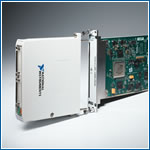National Instruments Adds Instrument-Class I/O to LabVIEW FPGA Hardware
New NI FlexRIO Product Family Increases FPGA-Based I/O Performance for PXI Test Systems
“LabVIEW FPGA technology will continue to transform instrumentation and extend graphical system design by providing software programmability at the hardware level,” said Dr. James Truchard, president, CEO and cofounder of National Instruments. “NI FlexRIO gives engineers a way to solve applications that were previously impossible with COTS hardware.”

NI FlexRIO FPGA modules feature high-performance Xilinx Virtex-5 FPGAs that engineers can program using the LabVIEW FPGA Module. Previously, FPGA technology was limited to a subset of hardware engineers with extensive knowledge in digital design, but LabVIEW FPGA makes this technology available to all engineers through intuitive graphical programming. Using LabVIEW FPGA, engineers gain direct access to raw digital pins on the NI FlexRIO FPGA modules, with 66 differential lines at up to 1 Gb/s per pair or 132 single-ended lines at up to 400 Mb/s. In addition, NI FlexRIO FPGA modules offer deep onboard memory and the ability to use external clocks.
All NI FlexRIO implementations require two distinct hardware pieces – a PXI FPGA module and an adapter module, which defines the specific I/O capabilities of the system. The first NI FlexRIO adapter module is the NI 6581 high-speed digital I/O adapter, which is ideal for algorithmic pattern generation and protocol-aware tests. The NI 6581 delivers 100 MHz of digital I/O (200 Mb/s DDR) through 54 single-ended channels with selectable voltage levels including 1.8 V, 2.5 V and 3.3 V (5 V compatible). National Instruments also has worked with Averna to create a plug-and-play IEEE 1394b adapter module, and expects many additional modules to be available from third parties in the future.
Additionally, NI FlexRIO offers engineers the flexibility to design their own custom adapter modules with the exact converters, buffers, clocks and connectors to meet their application needs. To help engineers develop their own module configurations, the NI FlexRIO Adapter Module Development Kit (MDK) features full documentation on electrical and mechanical design details, including CAD files and PCB outlines as well as various adapter module metal enclosures.
For more information and a four-minute video about NI FlexRIO, readers may visit www.ni.com/flexrio.
From: http://ni.com
Publication date: 12.11.2008
Other news ...
- ANALOG DEVICES’ INERTIAL SENSORS DELIVER COST-EFFECTIVE, EASY-TO-IMPLEMENT MOTION SENSING FOR INDUSTRIAL AND MEDICAL INSTRUMENTATION
- Infineon Launches Intelligent Lamp Ballast Controller for Fluorescent Lamps
- Tektronix Video Test Solution Wins Outstanding Technology Award
- Medical imaging equipment OEMs can achieve faster, more accurate results with TI's portfolio of embedded processors and analog products
- Ultrasound systems can produce clearer images with TI's new family of fully integrated high-voltage pulsers and switches
- TI's single-chip MSP430 MCU and low power RF solution advances networking, energy harvesting, security, lighting and metering
- National Semiconductor’s New Zero-Drift Amplifiers Break the Noise Barrier
- National Semiconductor Delivers Industry’s Best Linearity Performance with New High-Speed, 16-Bit ADC and DVGA
- Freescale inertial sensors enhance sensitivity of safety-critical automotive airbag systems
- Freescale delivers single-chip microcontroller solution for next-generation automotive gateways
- Infineon Introduces World’s Smallest ESD Protection Diode for RF Antennas
- Fujitsu to Release New Energy-Efficient 500 GB 2.5" HDD Models
- Fujitsu Achieves Record-Breaking Quarter in Hard Disk Drive Shipments
- CONVERGENT INDUSTRIAL APPLICATIONS PROFIT FROM WIDESPREAD ADOPTION OF ANALOG DEVICES PROCESSORS
- NEW SHARC® PROCESSORS PROVIDE THE INDUSTRY’S HIGHEST-PERFORMANCE FLOATING-POINT DSP
